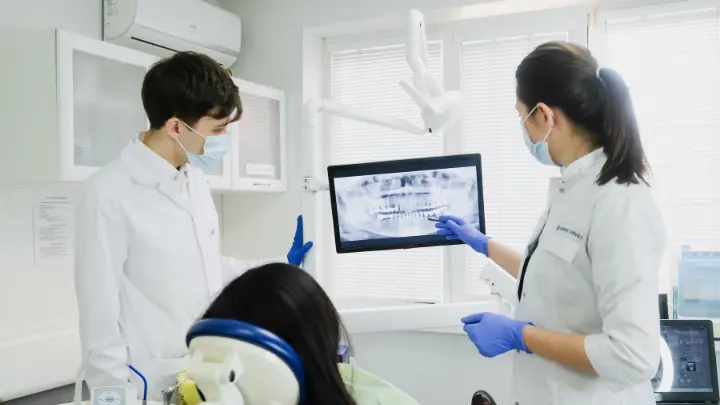Table of Contents
In today’s digital world, simply having a website for your dental practice isn’t enough.
You need to ensure that your site ranks well in search engine results to attract new patients.
SEO (Search Engine Optimisation) marketing is key to making this happen.
If you’re a dentist looking to grow your patient base, this guide will provide you with effective strategies to improve your online visibility and attract more patients.
Let’s get started!
Introduction to SEO marketing for dentists
SEO marketing involves optimising your website and online presence to rank higher in search engine results.
This makes it easier for potential patients to find you when they search for dental services.
By implementing the right SEO strategies, you can increase your website traffic, improve your online reputation, and ultimately grow your practice.
Why SEO is crucial for dental practices
Why should dentists invest in SEO?
The answer is simple: more visibility means more patients.
When people need dental services, they typically start with an online search.
If your practice appears at the top of the search results, you’re more likely to get their attention.
Effective SEO can lead to:
- Increased website traffic
- More appointment bookings
- Enhanced credibility and trust
- Better patient engagement
Keyword research for dental SEO
Keywords are the foundation of SEO.
These are the terms potential patients use when searching for dental services online.
To attract more patients, you need to identify and use the right keywords.
Here’s how:
- Use keyword research tools: Tools like Google Keyword Planner, Ahrefs, and SEMrush can help you find relevant keywords with high search volumes.
- Think like a patient: Consider what phrases your potential patients might use, such as \”dentist near me\”, \”dental implants\”, or \”teeth whitening in [your city]\”.
- Focus on long-tail keywords: These are longer, more specific phrases that people use when they’re closer to making a decision. For example, \”best dentist for dental implants in [your city]\”.
On-page SEO strategies
On-page SEO involves optimising the content and structure of your website to make it more search-engine friendly.
Here are some key on-page SEO strategies for dentists:
- Optimise title tags and meta descriptions: Ensure each page on your website has a unique title tag and meta description that includes relevant keywords.
- Use header tags effectively: Use H1 tags for your main title and H2 or H3 tags for subheadings. This helps search engines understand the structure of your content.
- Include keywords naturally: Incorporate your target keywords naturally into your content, but avoid keyword stuffing.
- Improve page load speed: Fast-loading pages are crucial for both user experience and SEO. Use tools like Google PageSpeed Insights to identify and fix speed issues.
- Add alt text to images: Use descriptive alt text for images to help search engines understand what the images are about.
Local SEO tactics for dentists
Local SEO is vital for dentists, as most patients search for local services.
Here are some strategies to enhance your local SEO:
- Optimise your Google My Business (GMB) profile: Ensure your GMB profile is complete with accurate business information, high-quality photos, and regular updates.
- Get listed in local directories: Submit your practice to local directories like Yelp, Healthgrades, and local business directories.
- Encourage patient reviews: Positive reviews on Google and other review sites can boost your local SEO and attract more patients.
- Use local keywords: Include your city or neighbourhood in your keywords, such as \”family dentist in [your city]\”.
Building a user-friendly website
A user-friendly website not only improves SEO but also enhances the patient experience.
Here’s how to build a site that attracts and retains visitors:
- Ensure easy navigation: Your website should be easy to navigate, with clear menus and logical page structures.
- Use a clean, professional design: A visually appealing design can make a great first impression.
- Make contact information accessible: Display your phone number, address, and contact form prominently on every page.
- Offer online booking: Simplify the appointment process with an online booking system.
- Provide valuable content: Include informative content about dental procedures, patient testimonials, and blog posts on dental health.
Creating valuable content for patients
Content is king in SEO.
Providing valuable content not only helps with SEO but also establishes your practice as an authority in dental care.
Here are some content ideas:
- Educational blog posts: Write articles about common dental issues, treatment options, and dental health tips.
- Patient testimonials: Share success stories from your patients (with their permission).
- Video content: Create videos explaining dental procedures, showcasing your office, or introducing your staff.
- FAQs: Address common questions and concerns about dental care.
Link building and online authority
Link building involves getting other websites to link back to your site, which can boost your SEO.
Here are some effective link-building strategies:
- Guest posting: Write articles for other dental or health-related blogs and include a link back to your site.
- Local partnerships: Partner with local businesses or organisations and get listed on their websites.
- Content marketing: Create high-quality, shareable content that others want to link to.
- Directory submissions: Ensure your practice is listed in reputable online directories.
Managing online reviews and reputation
Online reviews play a significant role in your practice’s reputation and SEO.
Here’s how to manage them effectively:
- Encourage satisfied patients to leave reviews: Ask happy patients to share their experiences online.
- Respond to reviews: Thank patients for positive reviews and address any negative feedback constructively.
- Monitor review sites regularly: Keep an eye on popular review sites to stay on top of your online reputation.
Leveraging social media for SEO
Social media can enhance your SEO efforts by driving traffic to your website and increasing your online visibility.
Here’s how to leverage social media:
- Create engaging content: Share dental tips, patient stories, and updates about your practice.
- Use social media ads: Target potential patients in your area with Facebook and Instagram ads.
- Engage with your audience: Respond to comments and messages promptly to build a strong online community.
- Use local hashtags: Help local users find your content by using relevant hashtags.
Mobile optimisation for dental websites
More people are using mobile devices to search for local services, so your website needs to be mobile-friendly.
Here’s how to optimise for mobile:
- Responsive design: Ensure your website adapts to different screen sizes.
- Fast loading speed: Mobile users expect quick results, so optimise your site for speed.
- Simplify navigation: Make it easy for mobile users to find what they need quickly.
- Click-to-call buttons: Make it easy for mobile users to call your practice with one click.
Monitoring and analysing your SEO performance
Tracking your SEO efforts is crucial to understand what’s working and what needs improvement.
Here are some tools and techniques:
- Google Analytics: Track website traffic, user behaviour, and conversions.
- Google Search Console: Monitor your site’s performance in search results, identify issues, and track keyword rankings.
- SEO tools: Tools like Moz, Ahrefs, and SEMrush can provide insights into your SEO performance.
Common SEO mistakes to avoid
Even with the best intentions, it’s easy to make mistakes in SEO.
Here are some common pitfalls and how to avoid them:
- Ignoring mobile users: Ensure your website is mobile-optimised.
- Inconsistent NAP information: Keep your business information consistent across all platforms.
- Neglecting reviews: Regularly encourage and respond to reviews.
- Skipping keyword research: Use relevant local keywords in your content.
- Overlooking on-page SEO: Don’t forget to optimise your website’s content and structure.
Future trends in dental SEO
The world of SEO is always evolving.
Here are some trends to keep an eye on:
- Voice search optimisation: With the rise of voice assistants like Siri and Alexa, optimising for voice search is becoming crucial. Use conversational language and long-tail keywords.
- Local services ads: Google’s local services ads can help you appear at the top of search results for local queries.
- Enhanced user experience: Google increasingly prioritises websites that offer a great user experience. Ensure your site is fast, secure, and easy to navigate.
In conclusion, mastering SEO marketing can significantly enhance your dental practice’s online presence, attract more local patients, and ultimately grow your business.
Start implementing these strategies today, and watch your practice flourish.
If you need more personalised guidance on SEO marketing, feel free to contact us at Keep Writing.
We’re here to help you succeed in the digital landscape.
Ready to boost your dental practice’s SEO?
Contact us at Keep Writing for expert advice and tailored strategies.
Let’s take your practice to the next level!
Author
-

Since 2017, Alistair has been immersed in the digital marketing world. His experience spans across leading brands like IG Group, Russell Investments, Tech.co, and Website Builder Expert, among others. Alistair decided that it's time to give back by building the soon to be largest digital marketing agency in the UK -> OKETTI. In his spare time, Al enjoys reading history, bouldering, and spending time with his family. Alistair aims to connect curious online minds with insights from experts, making a global impact. However, the experts we hire never describe themselves as experts because we know that there is always more one can learn.
View all posts


